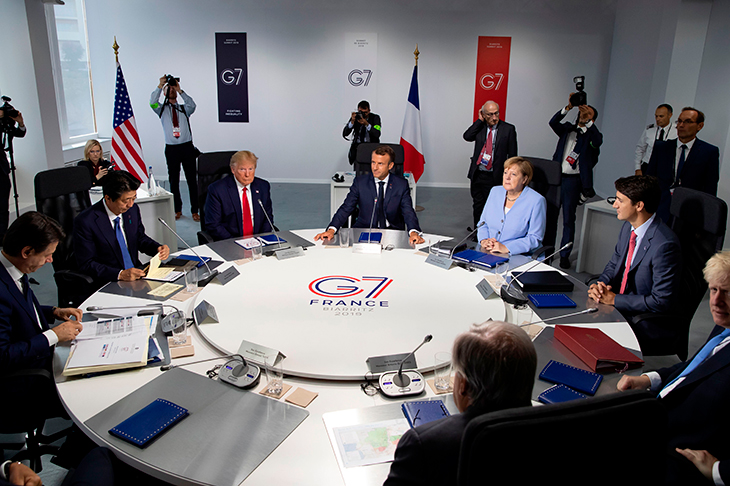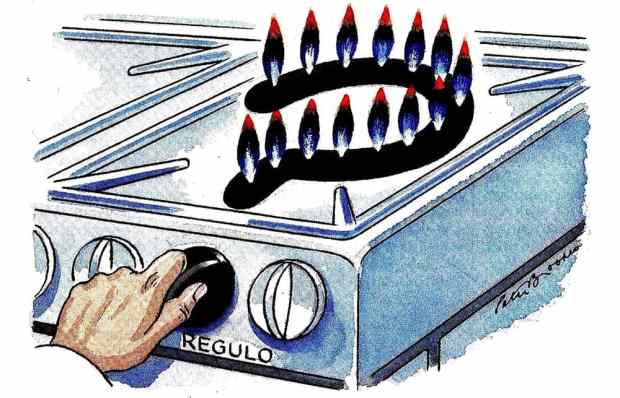When the G7 was first convened in 1976 it made sense for those countries to gather. In a world divided between democratic capitalism and authoritarian socialism, as well as between industrialised countries in the West and an almost universally poor ‘developing world’, the US, Japan, UK, Germany, France, Italy and Canada were the wealthy nations who could best solve problems. After the age of imperialism, a summit of the powerful seemed to symbolise a more enlightened way of doing things.
More than four decades later, a meeting of the same seven countries is an anachronism. What right have Italy and Canada (respectively the world’s eighth and tenth largest economies) to be at the top table when China (second), India (seventh) and Brazil (ninth) are excluded? Simply by its make-up, the G7 is beginning to look like a doomed effort to preserve the hegemony of white power. Its behaviour during the past week at Biarritz has cemented this impression. Under President Macron’s influence it has acquired an imperialistic air. It has itself become the thing which it sought to replace.
Not for the first time, the environment has been used as a pretext for western politicians to lord it over their counterparts elsewhere in the world. An outbreak of forest fires in Brazil has been exaggerated in order to create the impression of an emergency which justifies intervention. Yet as Matt Ridley and Charles Moore explain elsewhere in these pages, there is nothing novel about forest fires in the Amazon. Dramatic though the pictures might look, wildfires are a natural phenomenon which have been occurring ever since forests have been on the Earth. They can, of course, also be caused by human activities, yet there is no sign that they are increasing globally. On the contrary, data from Nasa satellites indicates a small gradual reduction over the past decade and a half.
You would not have picked this up from leaders at the G7 summit, who promised to send $22 million to help fight the fires — on the pretext that they were tackling a sudden and dramatic worsening of the symptoms of climate change. President Bolsonaro smelt a rat and rejected the money. As he correctly reasoned, handouts tend to come with a price — they were part of a package which included a long-term global strategy to protect the rainforest, which is shorthand for saying Macron expected Brazil to cede sovereignty of the rainforest to him and other G7 leaders.
The West has been attempting to elbow its way in to the issue of land use in Brazil for years — and not entirely out of concern for the environment. Brazil has huge agricultural potential which, given the chance, could make life more difficult for European and North American farmers. Macron’s fantasy that the Amazonian rainforests are the ‘lungs’ of the world has been dreamed up in an attempt to promote the idea that the Amazon is a common resource for all humanity. This is not a role which Macron would gladly accept for the forests of France. It seems to be fine for Europeans and North Americans to clear land for agricultural use — a job which was in many cases conveniently completed centuries ago — but not for developing countries whose agricultural sectors pose an economic threat to those of the West. As one of Bolsonaro’s ministers pointed out, the G7’s $22 million might be better spent on its own reforestation projects.
To put forest fires — along with climate change and biodiversity — top of the G7 agenda was mere political posturing on Macron’s part. Of course protecting the environment is important and no country is ultimately going to prosper by trashing its natural resources. But if developing countries had a hand in deciding the agenda in Biarritz they would surely have chosen a rather different emphasis on proceedings. Top of the agenda might have been opening up western food markets to competition from the developing world.
It was posturing, too, which put gender equality near the top of the agenda. That is surely an issue which individual nations can be allowed to decide for themselves. What should have dominated discussions, on the other hand, was the threat of global recession, which has increased hugely in recent weeks as several countries, including Britain, Germany and Italy, have reported poor growth figures and the yield on government bonds has turned negative. That is an issue on which global co-operation is vital. Little on that subject, however, from the G7. Instead a programme was seemingly devised to allow Macron to indulge in virtue-signalling, to present himself as the anti-Trump and spiritual leader of the EU.
What would have been the point, though, in discussing the global economy without the inclusion of powerhouses of growth such as China and India? The G7 came across as little more than a holiday club for world leaders, a weekend by the sea in an appropriately faded resort.
Got something to add? Join the discussion and comment below.
Get 10 issues for just $10
Subscribe to The Spectator Australia today for the next 10 magazine issues, plus full online access, for just $10.
You might disagree with half of it, but you’ll enjoy reading all of it. Try your first month for free, then just $2 a week for the remainder of your first year.














Comments
Don't miss out
Join the conversation with other Spectator Australia readers. Subscribe to leave a comment.
SUBSCRIBEAlready a subscriber? Log in